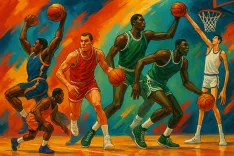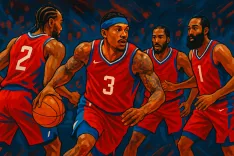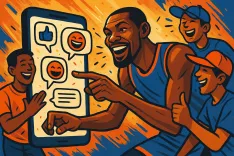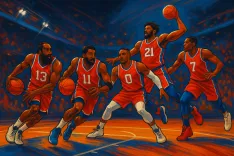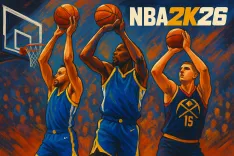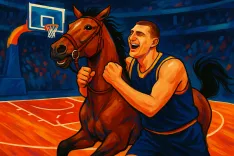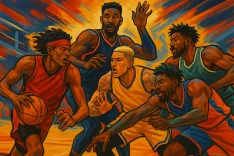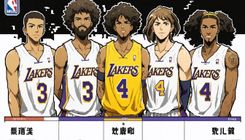Insights from the 2025 NBA Awards Season

The conclusion of the league's All-NBA and All-Defensive teams has marked the end of the 2025 awards season. While it is straightforward to acknowledge those who garnered awards as winners and those who did not as losers, the landscape of awards is more intricate. The implications of these awards extend beyond mere accolades, influencing the financial trajectories of various teams and players for the future. A summary of the key awards follows.
The All-Rookie First Team featured players such as Stephon Castle, Zaccharie Risacher, Jaylen Wells, Zach Edey, and Alex Sarr, while the Second Team included Matas Buzelis, Bub Carrington, Donovan Clingan, Kel'el Ware, and Yves Missi. For the All-Defensive First Team, the selections were Evan Mobley, Draymond Green, Dyson Daniels, Lu Dort, and Amen Thompson, with the Second Team comprised of Toumani Camara, Rudy Gobert, Jaren Jackson Jr., Jalen Williams, and Ivica Zubac. The All-NBA First Team honored Shai Gilgeous-Alexander, Nikola Jokic, Giannis Antetokounmpo, Jayson Tatum, and Donovan Mitchell, while the Second Team included Jalen Brunson, Stephen Curry, Anthony Edwards, LeBron James, and Evan Mobley, and the Third Team saw Cade Cunningham, Tyrese Haliburton, James Harden, Karl-Anthony Towns, and Jalen Williams recognized.
For years, debates surrounding the NBA MVP have often been reduced to a singular question: Who is the best player on the best team? This perspective, while simplistic, has found supporters within the basketball community. In various seasons, such a narrow focus yields results that may not accurately capture a player’s value; however, outcomes can differ between seasons. The 2024-25 MVP voting could lend support to this school of thought. Despite being an unconventional standard for the 'best team,' the Oklahoma City Thunder established remarkable records, such as the all-time records for single-season point differential and double-digit wins.
Shai Gilgeous-Alexander's individual plus-minus of 918 ranks as the fifth highest recorded, following only a handful of seasons by Stephen Curry and Draymond Green. In addition, he led the league in estimated plus-minus and total points by a significant margin. Thus, while SGA's argument for MVP transcends his team’s performance, his recognition could reinforce the belief that being the top player on the top team is a sound approach to evaluating this honor. However, prominent voices in the MVP discourse sometimes reduce SGA's candidacy to simplistic comparisons, asserting, for instance, that Nikola Jokic may be the best player, but Shai represents true value. Such statements often lack depth and fail to engage in a nuanced exploration of 'value.'
In 2025, the MVP discussion warrants more comprehensive examination than it often receives, especially given the surplus of available data. Key considerations include whether Jokic's achievement of averaging a triple-double, coupled with his superior scoring efficiency and net rating influence, should elevate his candidacy over that of SGA. The implications of voter fatigue and historical patterns may also merit scrutiny. Furthermore, evaluating the impact of a player's supporting cast is essential. These inquiries remain pertinent; yet, they frequently go unaddressed in MVP dialogues. The current awards season underscored such ambiguous questions as representatives sought to find clarity around divergent opinions. The MVP debate exemplifies this as both Jokic and SGA possess compelling cases that defy a straightforward resolution.
Evan Mobley's selection as the Defensive Player of the Year also sparked discussions on the merits of the award. While his defensive performance is commendable, his defensive estimated plus-minus does not place him at the top of the rankings, and his team’s defensive efficiency metrics tell a similar story. Comparatively, Dyson Daniels achieved an impressive average of 3.0 steals per game, a figure that has not been reached in three decades, while Draymond Green's defensive versatility contributed significantly to the Golden State Warriors, who secured the best defensive rating following the trade deadline. The Clutch Player of the Year award similarly showcased the influence of differing criteria. If playmaking and defensive contributions were weighted more heavily over pure scoring, it is conceivable that Jokic would have been recognized over Jalen Brunson.
The parameters defining awards like Most Improved Player and Rookie of the Year can lead to varied outcomes based on those criteria. However, none of the decisions from the 2024-25 season were outright incorrect; instead, these results showcased the subjective nature of the honors. The depth of talent within the NBA enhances the competitive landscape, rewarding fans with numerous deserving candidates across various categories. Furthermore, the consequential relationship between collective bargaining agreements and player earnings adds another layer to the discussion surrounding individual achievements. Success in gaining accolades such as MVP or DPOY can greatly affect salary cap implications for young players, who are poised to negotiate lucrative contracts following these honors.
Evan Mobley, having clinched the Defensive Player of the Year title, exemplifies this trend as he transitions into a substantially higher salary bracket, moving from 25 percent of the cap to a projected 30 percent, translating into an increase of over $7 million for the 2025-26 season. This increment will inevitably impose challenges on the Cleveland Cavaliers as they navigate the complexities of team-building. Balancing finances becomes increasingly complicated with a foundational player like Mobley receiving such a significant contract boost. As his salary increases, Cleveland may face decisions that impact their depth, particularly regarding potential role players whose contracts are aligned with the team's cap structure. The heightened salary will also likely lead to increased luxury tax obligations for the Cavaliers, further complicating their financial strategy.
Moreover, Cade Cunningham, after being named to the Third Team All-NBA, is among the players who will benefit from shifting contract statuses. The Detroit Pistons will find themselves in a favorable position as they manage their salary cap, particularly given the absence of numerous high-value contracts on their roster. However, the story does not end there, as players like Jaren Jackson Jr. and Trae Young are at risk of losing out on significant financial opportunities due to their failure to achieve All-NBA recognition. Young's potential for a supermax extension is curtailed, while Jackson's path to maximizing his earnings could involve a creative restructuring of contracts.
Examining SGA's MVP designation further unveils economic ramifications, with Gilgeous-Alexander potentially eligible for an astounding five-year, $380 million contract extension. Over the past five seasons, SGA has participated in 310 games, positioning him to earn an extraordinary sum if his current trajectory continues. Faced with such unprecedented financial prospects, Gilgeous-Alexander exemplifies the evolution of player contracts in the current NBA landscape.
